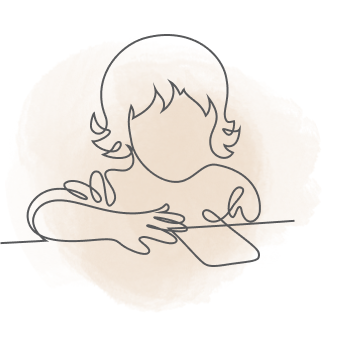Curriculum Guide
Our Philosophy
Our belief in the unlimited potential of children is at the heart of all we do.
We believe that all children are budding scientists, artists, mathematicians, authors, and scholars and have an inherent drive to learn and make a positive impact on the world.

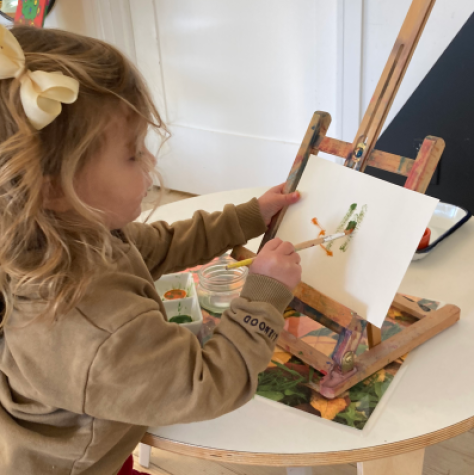
OUR CURRICULUM
Playful Learning provides personalized learning in an innovative studio environment. Engaging lessons, access to inspiring materials, and our highly specialized instruction provide a truly unique early childhood experience. By tapping into each child’s innate curiosity, we nurture their natural desire to dive deeply into academic endeavors, seek answers to their questions, and master important skills.
Our studio gardens and outdoor classrooms bring the natural environment into our learning experiences through daily outdoor explorations and investigations. These experiences spark curiosity, nurture a spirit of adventure, and instill a love of the natural world.
SCOPE & SEQUENCE
Playful Learning offers an interdisciplinary approach to learning as children explore engaging themes such as rocks and minerals, architecture and buildings, local ecosystems, adventures in space, botany explorations, journeys in geography, and more! Each theme is taught through a variety of disciplines, such as art, science, literacy, movement, math, social & emotional learning, and practical life. This approach inspires children to see each topic through multiple perspectives and allows them to express their newfound understanding through multiple creative mediums.
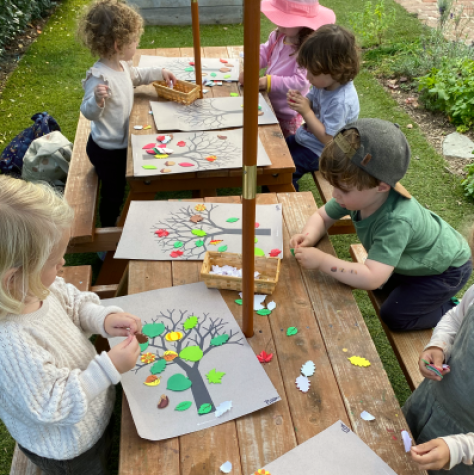


Literacy
- Support oral language development and increase vocabulary
- Model and encourage use of language for communication
- Foster a love of literature through shared reading of stories, poetry and songs
- Develop awareness that spoken language is related to a system of written symbols
- Encourage early literacy skills such as sound/symbol correspondence
- Encourage early “writing” of stories through drawings and the use of dictation
MATH
- Introduce pre-math concepts through hands-on experiences with a variety of materials
- Build ability to count using one-to-one correspondence
- Begin to develop number recognition
- Develop awareness of shapes and size relationships
- Practice sorting according to attributes such as size, shape and color
- Predict, create and duplicate patterns using manipulative
- Create and interpret simple graphs
- Begin to develop an awareness of spatial relationships, balance and symmetry through block building


Social & Emotional
- Create a safe, nurturing environment to facilitate a smooth, comfortable transition from school to home
- Encourage children to be open to new experiences and willing to take risks
- Introduce, encourage and support the practice of sharing, taking turns and cooperative play/work
- Facilitate social development as children move from parallel play to interaction with classmates
- Encourage the use of language to communicate thoughts, ideas and needs with teachers and classmates
- Explore and appreciate similarities and differences between and among each other
SCIENCE
- Develop the skills of communication, observation, estimation, measurement, cause and effect, investigation and evaluation
- Explore elements of the natural world through field experiences at school as well as the larger community
- Use early scientific method: ask, guess, try and answer
- Introduce scientific tools: magnifying glasses, measuring units, magnets, and others
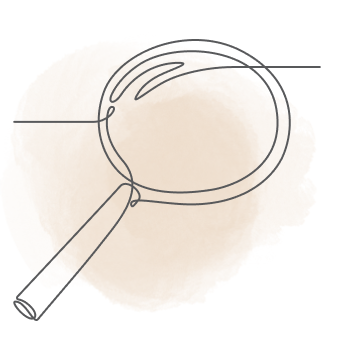

ART & Music
- Provide opportunities for artistic expression in an atmosphere that is safe and nurturing
- Encourage children to experience, invent, and freely express themselves with a focus on process as well as product
- Art as process: experiment with new materials and use familiar ones in new ways
- Art as language: utilize a variety of creative mediums to express gained understanding and knowledge
- Access to a variety of high-quality art materials and other creative provocations such as: paint, collage, clay, fabric, wood, natural materials, and others with rich tactile qualities
- Learn about and create art inspired by individual artists
MOTOR DEVELOPMENT
- Develop eye-hand coordination and fine motor skills though working with a variety of of tools and sensory materials for creating, building, drawing, and writing
- Provide opportunities for large motor movement that encourage children to coordinate and control large muscles and sequence their movements
- Encourage children to exhibit body awareness and spatial boundaries
- Encourage movement as a form of expression (i.e., dance)
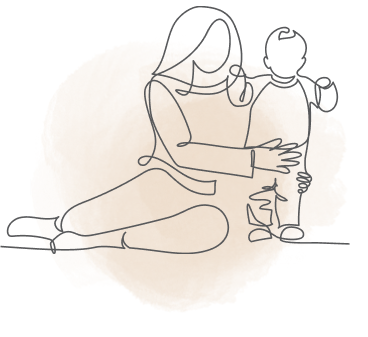

PLACE-BASED EDUCATION
- Develop an understanding and appreciation of the natural world and the interconnectedness of all living things
- Enhance social and emotional development through hands-on experiences in a supportive and natural environment, promoting teamwork, communication, and cooperation with peers
- Improve physical health and well-being through active outdoor play and exploration
- Increase cognitive and sensory development through observation, investigation, and discovery
- Provide opportunities to learn about and understand native plants, animals, and trees through direct observation and interaction in their natural habitats within our outdoor classroom setting
- Engage in local field experiences that explore local bioregions and ecological systems: bay, forest, pond, and farm
- Become stewards of the local land through community service projects with local non-profit organizations such as Group for the Southfork, Long Island Surfrider Foundation, LVIS, and more!
Practical Life
- Develop fine motor control through activities such as pouring, spooning, sweeping, and buttoning
- Learn the skills of self-care, such as setting the table, dressing, and preparing snacks—promoting a sense of autonomy and self-confidence
- Develop ability to concentrate and focus through activities that capture and require their full attention
- Learn to take care of their environment through activities such as cleaning and caring for plants, promoting a sense of responsibility and respect for surroundings
